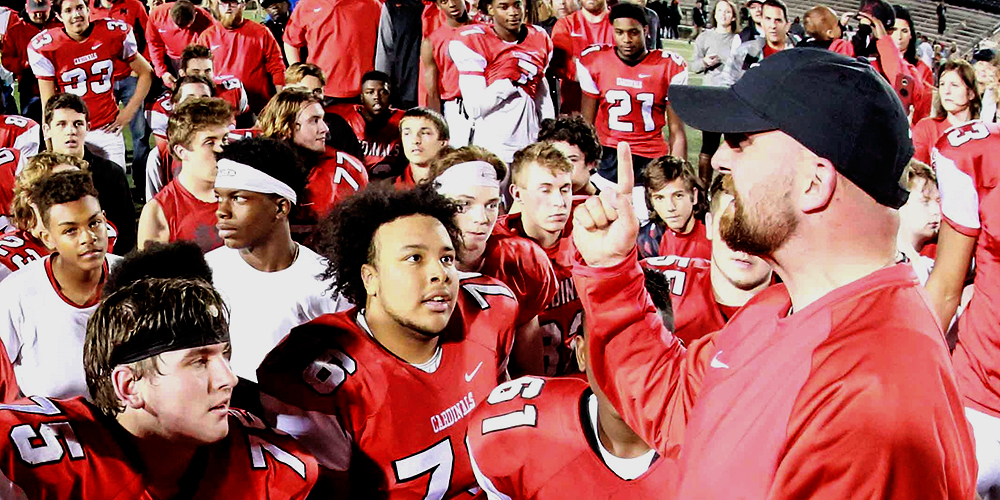Let the high school football coaching dream begin!
Are you dreaming of becoming the next Bear Bryant or Bill Belichick, but at the high school level?
The truth is, even the most distinguished coaches of all time got their start somewhere. So if you’re starting out with aspirations of becoming a high school football coach, you need to approach your journey with that mindset.
Education requirements to become a high school football coach
While it’s not required, having a college degree — especially if said degree encompasses a background in advanced education could make you a more attractive candidate to start out as a high school coach. Many high schools will give preferences to people with either education-based backgrounds, or backgrounds in athletic disciplines as well. However, even if you’re someone with a degree in business or science or anything that’s not directly applicable to football, having a college degree, or even an associate’s degree is a very beneficial first step. So if you’re serious about becoming a high school coach, and you didn’t get the chance to finish college previously, you may want to consider enrolling part-time in your local college or community college to finish your degree; your potential benefit is that you can now focus your area of study in something that will be directly applicable to your future coaching career.

To that end, especially because many high school coaching positions might not pay out the highest salary from the onset, you might want to focus your efforts on becoming a teacher at the school, and then networking with or lobbying the right people at the school to get a chance to coach there. The reality is that many school districts around the country don’t have the funds to hire people who are exclusively coaching for a given sport, including football. Instead, what they’ll do is have someone like their physical education teacher double as their football or basketball coach, or hire a coach for their football or basketball program and then have that coach teach a few sports-related classes. Either way, you want to be well-prepared as a teacher, because this might be your best avenue to get into coaching. The USA Football website, it specifically mentions that individuals who want to become a high school coach should obtain either a college degree or some type of teaching credentials, as something of a prerequisite to becoming a coach.
Spruce up your high school football coaching resume
If you’re someone who does have a college degree, and you want to stand out from the rest of your peers when a coaching opportunity comes up, you should also look into getting certified through the National High School Coaches Association. This certification essentially demonstrates that you have a deeper understanding o the responsibility associated with being a youth sports coach at that level. The certification courses cover things like the fundamentals, administration, laws, first aid and safety, and ethics involving each sport, or youth sports in general. While you’re far from guaranteed from getting a coaching job with such a certification, as mentioned, it’ll at least make you a more attractive candidate to a school or locality looking for a new member of the coaching staff.
Aside from the educational route, as many people know, the best type of education in any field of practice is a real-world experience. That’s why many aspiring coaches approach a future coaching career taking one of two different routes: coaching in youth sporting leagues or serving as a volunteer on a high school sports team.
Take on coaching football at the pee-wee level
Many counties will have pee-wee-type sporting leagues for children under 12 years old, and while they’ll have no lack of enthusiastic parents to attend any of these games, they certainly have a lack of coaches who are committed to coaching kids of this age level (since everyone usually wants to start out at the high school level). This is a great opportunity to start your coaching career and not only understand just what it takes to coach young kids and get them ready for game day on a regular basis but also to put something on your resume that will show your experience in this matter.

But if that doesn’t sound like your cup of tea, or if you do have the chance to start off on a high school star (albeit on an unpaid basis), you shouldn’t pass up taking this route. Many of the most well-known coaches on the planet, in any sport, started out as a low-paid (if not volunteer) coach on a high school or college staff somewhere and then worked their way up to a quality control coach, then a position coach, then a coordinator, and eventually a head coach. As mentioned, many counties and schools want to have a robust coaching staff for their school, but simply lack the funds; if they can get access to a capable coaching candidate who’s willing to work for little (if any) money, why would they pass that up? That’s where you enter into the picture. Go in and prove your worth: not only as a coach but as someone who deserves to be on the payroll.
Football coaches need to be prepared when opportunity knocks
While you’re waiting for that coaching opportunity to present itself, you also want to do your best to be prepared such that you’re ready to contribute when the opportunity arises. With that in mind, remember that a football coach, at any level, is really a teacher. It’s their role to lead and guide the path of the team they’re coaching, and to teach them the game such that they’re prepared to take on their opponent each and every time they step on the field.
Distilling that down a bit further, you want to prepare as a coach by being the best possible leader or “people manager” of your team, and you want to make sure that you’re as well-versed in the “X’s and O’s” of football. There are coaches who are great leaders of man, and there are coaches who are great tacticians; it’s the legendary coaches who are able to do both.
Further your education in the world of sports
We all talk about how teams “play hard for their coach,” but how do you get that to actually happen? It might seem a bit silly or pointless, but if you’re truly interested in becoming a sports coach, and especially a successful one, you should definitely get your hands on as many leadership books as possible, and read them with a keen interest on how to reach, teach, and motivate people — like the team you’ll be coaching.

Again, it’s great if you can get to a place where your team will run through a brick wall for you, but if they have nowhere to go after running through a said brick wall, then all that energy they have is a bit pointless. You want to be able to teach them the game as well: both the fundamentals and through an innovative game plan. So you want to approach your studies of the coaching craft the same way: devouring as much information as you can about the latest trends in football. There is a whole trove of information available online about coaching schemes and film breakdowns, and once you do become a coach, there are numerous coaching clinics held by local high school and college coaches. You’ll definitely want to attend these, especially if they allow you to attend before you become a coach.


